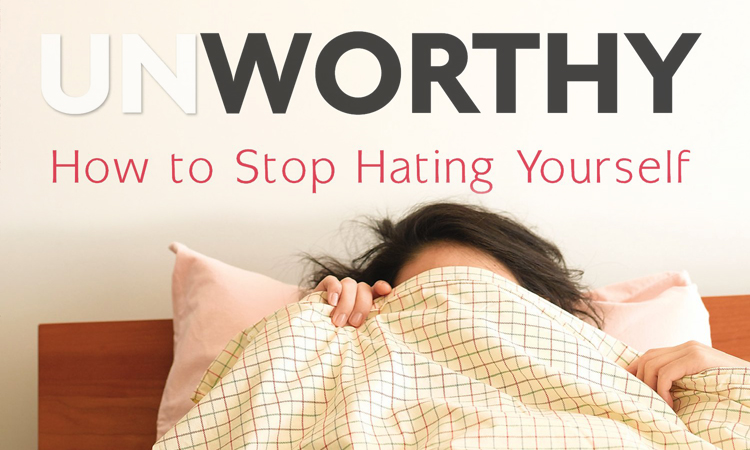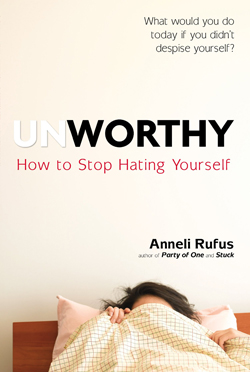
When did you first start hating yourself? Was it when you ventured onto a public beach in a new bikini? Was it even earlier? According to author Anneli Rufus, some of us may be biologically wired to have low self-esteem. In her book Unworthy: How to Stop Hating Yourself, Anneli investigates the personal, societal, biological, and historical factors that lead to self-loathing. Having struggled with low self-esteem herself, Anneli has a fresh and uplifting perspective that will help you find your own path to healing and self-acceptance.
Here’s an excerpt from Unworthy: How to Stop Hating Yourself by Anneli Rufus.
We weren’t born hating ourselves. No one is. But were some of us biologically predestined to start hating ourselves somewhere down the line? Is low self-esteem in our DNA?
Developmental psychologists avow that, until age three, human brains are neurochemically and psychologically incapable of the kind of self-reflection that can warp into self-loathing.
Newborns never question their existence. Like infants of all species, they have only one desire: survival. Cellularly speaking, this is sheer self-love.
During their first year, human infants learn that their bodies occupy space, are separate from and can impact or mimic other objects. This knowledge gives babies what psychologists call an implicit sense of self.
During its second year, the human brain is learning how to please. In one study, eighteen-month-old babies watched adults responding to various foods with happy or disgusted faces. Asked to select some of the foods to offer the adults, the babies consistently gave the adults whichever foods they had seen making the adults appear happy.
By age two, a sense of self emerges as toddlers first recognize themselves in mirrors and use first-person pronouns to savor their first sparks of agency: It’s mine.
Self-awareness deepens as, by age three, children start understanding themselves as what developmental psychologists call “enduring entities”—individuals whose past and present experiences intersect and have meaning: I spilled the milk, just like before, which made Dad mad.
At age three, two new emotions—embarrassment and shame—emerge. At three, some children start shrinking away from their own mirror images. Thus dawns the social self, the public self, the judging self: the self that can dislike itself.
At some point after being born—be it three years, thirteen years, sixty—certain people start hating themselves. Whom? Why? Under identical conditions, three randomly chosen people are told they are hideous. Two won’t believe it. One will. Why? Although no newborn hates itself, are some predestined, neurochemically, to later be afflicted with low self-esteem? Does a low self-esteem gene exist in human DNA?
 Scientists have identified a breast-cancer gene, a diabetes gene, an obesity gene, even an addiction gene—and have actually come close to identifying a self-loathing gene.
Scientists have identified a breast-cancer gene, a diabetes gene, an obesity gene, even an addiction gene—and have actually come close to identifying a self-loathing gene.
In one study, researchers set out to determine whether variants of the oxytocin-receptor (aka OXTR) gene might be linked to psychological aspects including self-esteem, optimism, and a sense of mastery. Popularly known as the feel-good hormone, oxytocin is a hormone linked with positive emotions and social skills. The researchers found that people who had one or two copies of the OXTR gene with a type of allele known as an adenine allele tended to have less optimism, self-esteem, and sense of mastery—and more negative emotions such as depression—than people who had a different allele known as the guanine allele.
The fact that human beings aren’t all born alike — that our personalities, potentialities, and latent likes and dislikes are to some extent blueprinted in the womb — is a relatively new discovery. For most of history, it was assumed that human beings are blank slates at birth: all identically uninflected, our characters coalescing over time, shaped wholly by our families, circumstances, and societies: by nurture, not by nature.
Recent research shatters this tabula rasa theory. Magnetic resonance imaging reveals highly varied, highly individualized patternings and concentrations of gray matter—which comprises mainly neurons and synapses—in the brains of human newborns. These diverse patterns have been shown to prove that many traits and talents are inborn.
Just as some people are born with aptitudes for math or music, those with the putative low self-esteem gene might be born with innate sensitivities that establish them as born self-haters. They don’t hate themselves at the literal moment of birth any more than born debaters are literally born debating. But if the low self-esteem gene really exists, born self-haters are perpetually at higher risk than other people for losing self-esteem, just as those with family histories of diabetes are at higher risk for developing that disease.
Which traits might the low self-esteem gene entail? Studies have not yet been conducted examining the MRIs of newborns for the long-term purpose of gauging and tracking their self-esteem. But if gray-matter patterns can predetermine habits and quirks as it has proven to do in studies of identical twins, then gray-matter patterns can predict propensities for shame, fear, pessimism, insecurity, hypersensitivity, perfectionism and other esteem-crushers.
The possible existence of a low self-esteem gene lends scientific heft to the notion of self-loathing as a syndrome, an assemblage of molecules that could happen to anyone. In other words, those awful things you think about yourself aren’t facts, and aren’t your fault.
Author Bio: Anneli Rufus is the author of Party of One: A Loner’s Manifesto, Stuck: Why We Can’t (or Won’t) Move On, and her newest release Unworthy: How to Stop Hating Yourself, now out in paperback. She has been a contributor to sites such as Salon.com, The Daily Beast, and Alternet. Anneli blogs about low self-esteem for Spirituality & Health, Huffington Post, and Psychology Today.
Adapted from Unworthy: How to Stop Hating Yourself by Anneli Rufus. © 2015 by Anneli Rufus. Published by Jeremy P. Tarcher, an imprint of Penguin, a division of Penguin Group USA, a Penguin Random House Company.
To find out even more about Rose’s thoughts on how to live a happier life, click here



3 Comments
Charolette
This is a very insightful review of an interesting book. Sounds like a good read! Thanks for sharing.
Kendra Patterson
At first glance, I wasn’t expecting this article to be so interesting – but wow! I need to get this book!! Thanks for this insight in Anneli Rufus’ book, Gianna!!
Cairns
Really, won’t buy your book. Already feeling defeated. I don’t need another author sp[eddlling no hope.